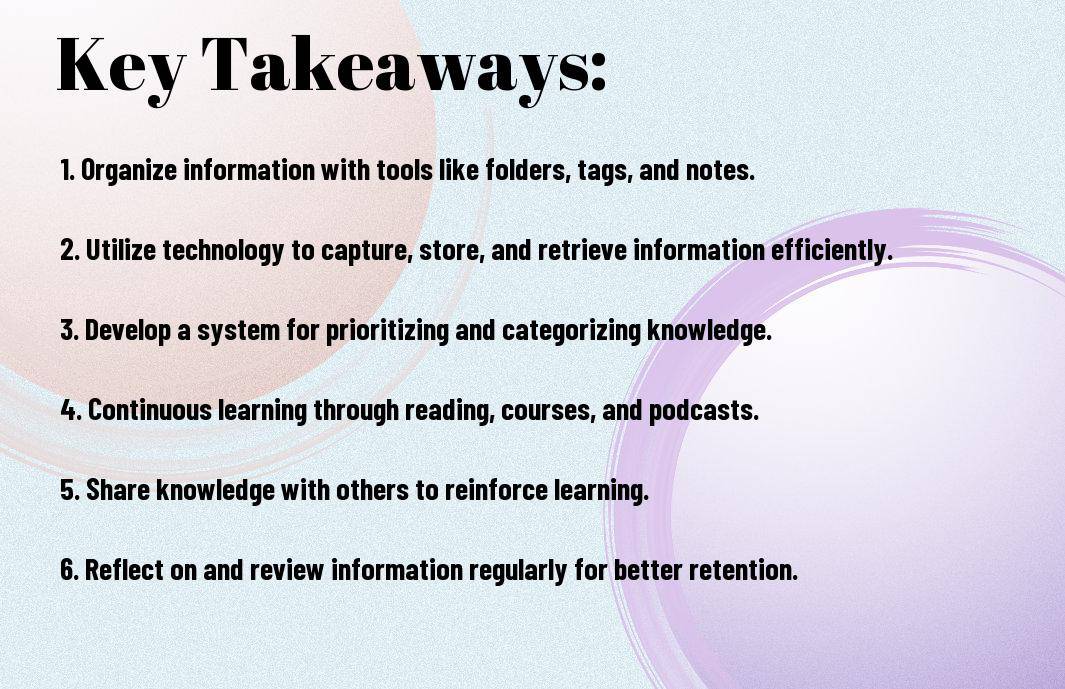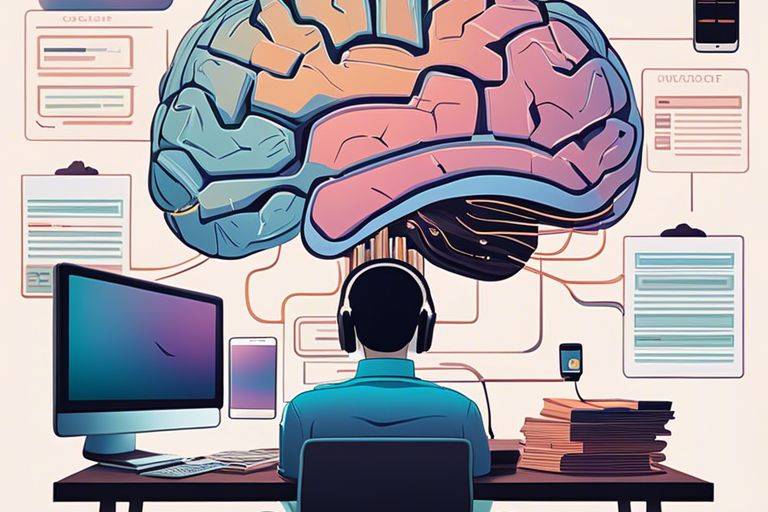Master Your Knowledge – Strategies for Personal Knowledge Management! The management of one’s personal knowledge is crucial in this information age. With an overwhelming amount of data available at our fingertips, it is important to master the art of organizing and utilizing this knowledge effectively. In this blog post, we will explore strategies to help you manage your personal knowledge efficiently and maximize your learning potential.
Key Takeaways:
- Personal Knowledge Management (PKM) is imperative: Managing your knowledge effectively can help increase productivity and improve decision-making.
- Strategies for PKM: Establish a routine for organizing and capturing information, utilize tools such as note-taking apps, and prioritize continuous learning.
- Filtering information is crucial: Develop the skill to sift through vast amounts of information to focus on what is most relevant and valuable to you.
- Establish a knowledge network: Cultivate relationships with individuals who can provide insights, expertise, and new perspectives on various topics.
- Reflection is key: Take time to reflect on what you have learned, connect new knowledge with existing knowledge, and identify areas for growth.
- Continuous learning is a mindset: Embrace a growth mindset and commit to lifelong learning to stay relevant and adapt to new challenges and opportunities.
- Share your knowledge: Contribute to the knowledge community by sharing insights, resources, and experiences to benefit others and foster collaboration.


The Foundations of Personal Knowledge Management
Defining Personal Knowledge Management
To master your knowledge effectively, understanding Personal Knowledge Management (PKM) is crucial. A Complete Guide to Tagging for Personal Knowledge Management can be an excellent resource to dive deeper into this concept. To define PKM, it is the process of managing and organizing one’s own knowledge for personal growth, learning, and productivity. This involves capturing information, organizing it in a way that makes sense to the individual, and retrieving it when needed to facilitate decision-making and problem-solving.
Core Components of PKM
Knowledge curation, organization, and retrieval are the core components of PKM. Through knowledge curation, individuals collect and filter information that is relevant to their interests and goals. Organization involves structuring this curated knowledge in a meaningful way, often using tools like note-taking systems, databases, or even physical files. Retrieval focuses on the ability to access stored knowledge efficiently when required, enabling individuals to leverage their insights effectively.
The Role of Technology in PKM
Another pivotal aspect of PKM is the integration of technology to enhance knowledge management processes. Technology tools such as digital notebooks, knowledge bases, and project management software can streamline information organization and retrieval. These tools offer features like tagging, search capabilities, and linking, which can significantly improve the efficiency and effectiveness of managing personal knowledge.
Creating Your PKM System
Identifying Your Knowledge Needs
Not all knowledge is created equal. Before entering into creating your Personal Knowledge Management (PKM) system, it’s crucial to identify your specific knowledge needs. One way to do this is by conducting a personal knowledge audit. This involves evaluating the types of information and skills you need to excel in your personal and professional life. By understanding your knowledge gaps and areas of interest, you can tailor your PKM system to meet your unique needs.
Designing Your PKM Workflow
Workflow management is important for a successful PKM system. It involves establishing a structured process for capturing, organizing, and retrieving information. Your PKM workflow should be seamless and intuitive, allowing you to effortlessly navigate through your knowledge repositories. By designing a well-thought-out workflow, you can maximize the efficiency of your PKM system and ensure that you can easily access the information you need when you need it.
To fully optimize your PKM workflow, you need to strike a balance between automation and manual curation. Automation tools can help streamline routine tasks such as capturing web content or sending reminders. On the other hand, manual curation allows you to personalize your knowledge organization and ensure the accuracy and relevance of your data. By combining both approaches, you can create a robust and efficient PKM workflow tailored to your preferences and requirements.
Tools and Resources for PKM
To effectively manage your personal knowledge, you’ll need the right tools and resources at your disposal. There are several software applications and platforms specifically designed for PKM, such as note-taking apps, cloud storage services, and mind mapping tools. These tools can help you capture, organize, and retrieve information in a structured and meaningful way.
To make the most of your PKM tools, it’s crucial to understand their functionalities and how they can integrate into your workflow. Look for tools that offer features like tagging, search capabilities, and cross-platform syncing to ensure seamless information management. By utilizing the right tools and resources, you can enhance your PKM system and effectively master your knowledge in the digital age.
Understanding your knowledge needs and designing a tailored PKM workflow are important steps in creating an effective personal knowledge management system. By leveraging the right tools and resources, you can optimize your knowledge organization and retrieval process, ultimately enhancing your productivity and decision-making capabilities.
Information Collection Techniques
Effective Note-Taking Strategies
Keep in mind that effective note-taking is vital for mastering your knowledge. Whether you prefer digital note-taking apps or good old-fashioned pen and paper, find a method that works best for you. One popular technique is the Cornell method, which involves dividing your notes into cues, main points, and summaries. This structured approach can help you retain information and easily review it later.
Leveraging Digital and Physical Resources
An important aspect of personal knowledge management is leveraging both digital and physical resources. On the digital side, tools like Evernote, Microsoft OneNote, or Notion can help you organize your notes, articles, and other digital content efficiently. On the physical side, consider keeping a personal library with books, journals, and other printed materials that you can reference whenever needed.
On the digital front, make use of online research tools such as Google Scholar, JSTOR, or academic databases to access a wealth of information. These resources can provide you with valuable insights on various topics and help you enrich your knowledge base.
Building a Personal Knowledge Database
Plus, creating a personal knowledge database is a powerful way to consolidate and manage your information effectively. You can use tools like Zettelkasten, Roam Research, or even a simple Excel spreadsheet to organize your notes, ideas, and references. By structuring your database with tags, categories, and links, you can easily retrieve and connect relevant information when needed.
Strategies for building a personal knowledge database include regular updates, cross-referencing related topics, and syncing your database across different devices for easy access. This centralized repository of knowledge can serve as your go-to source for information, insights, and inspiration in your personal and professional pursuits.
Physical notebooks and folders can offer a more tactile and focused approach to organizing your information, providing a break from screens and digital distractions. Additionally, annotating books and articles with your insights and reflections can deepen your understanding and retention of key concepts.
Organizing and Processing Your Knowledge
To manage your personal knowledge effectively, it is crucial to adopt strategies that will help you organize and process the vast amount of information you encounter on a daily basis. By implementing systematic methods, you can enhance your ability to retain, retrieve, and utilize knowledge in a more efficient manner.
Categorization and Tagging Methods
Any successful personal knowledge management system relies on effective categorization and tagging methods. This involves organizing information into specific categories and assigning relevant tags to facilitate quick retrieval and association of related concepts. Some popular methods include using hierarchical structures, creating topic clusters, or adopting a tagging system based on keywords or themes.
Synthesizing Information for Better Understanding
With the abundance of information available, it is vital to develop the skill of synthesizing data to gain a deeper understanding of complex topics. By synthesizing information, you can connect disparate pieces of knowledge, recognize patterns, and derive meaningful insights. This process involves critically analyzing information, identifying key points, and integrating them to form a coherent understanding.
It is through synthesizing information that you can transform fragmented knowledge into a comprehensive understanding of a subject, enabling you to make informed decisions and draw valuable conclusions.
The Art of Summarization and Mapping
One of the key components of effective personal knowledge management is the art of summarization and mapping. Summarization involves condensing information into concise and digestible formats, such as summaries, abstracts, or mind maps, allowing for quick reference and review. Mapping, on the other hand, entails visually representing connections between concepts, ideas, and data points to facilitate comprehension and recall.
Tagging
Knowledge Retention Strategies
Your ability to retain knowledge is crucial for personal growth and professional success. By employing effective knowledge retention strategies, you can make the most of your learning experiences and continuously expand your expertise. This chapter explores techniques and systems that can help you master your knowledge and improve your long-term recall.
Memory Enhancement Techniques
Techniques such as visualization, association, and mnemonic devices can significantly enhance your memory retention. Visualization involves creating mental images to represent information, making it easier for your brain to recall later. Association links new information to existing knowledge, creating a web of connections that make retrieval more efficient. Mnemonic devices, such as acronyms or rhymes, provide shortcuts for remembering complex information through memorable cues.
Spaced Repetition Systems for Long-Term Recall
The use of spaced repetition systems is a proven method for long-term retention of information. These systems schedule review sessions at increasing intervals over time, optimizing memory consolidation. By revisiting material at strategic intervals, you reinforce your memory and facilitate the transition of knowledge from short-term to long-term storage.
The implementation of spaced repetition systems in digital tools like Anki or Quizlet allows for customized review schedules and efficient knowledge retention. Leveraging these systems can help you maximize the effectiveness of your studying and make long-lasting learning gains.
The Role of Reflection in Knowledge Retention
Enhancement of knowledge retention can be achieved through deliberate reflection on new information. Taking the time to ponder and connect new knowledge with your existing understanding strengthens neural pathways associated with memory retention. Reflection allows you to extract deeper meaning from the information, making it more memorable and applicable in various contexts.
For instance, allocating dedicated time for reflection after learning sessions can significantly boost your retention and comprehension of complex concepts. By engaging in reflective practices regularly, you reinforce your learning and solidify your grasp on the material, leading to lasting knowledge retention.
Sharing and Applying Your Knowledge
Communication Skills for Knowledge Dissemination
Once again, sharing your knowledge effectively is crucial for personal knowledge management. Communication skills play a vital role in disseminating your knowledge to others. Whether you are sharing your insights with colleagues, presenting your findings to a team, or writing a report for clients, clear and concise communication is key. To be an effective knowledge sharer, you need to tailor your message to your audience, choose the right medium for communication, and always seek feedback to ensure your message is understood.
Collaboration and Community Engagement
For effective personal knowledge management, collaboration and community engagement are necessary. By collaborating with others who have different perspectives and expertise, you can enrich your own knowledge and gain new insights. Engaging with a community of like-minded individuals or experts in your field can provide you with valuable feedback, support, and resources to further develop your knowledge and skills.
Collaboration not only helps in expanding your knowledge but also fosters a sense of belonging and shared learning. Joining professional networks, attending industry events, and participating in online forums are great ways to connect with others and build a community around your interests.
Applying Knowledge to Problem-Solving and Decision Making
Communication
Applying your knowledge to problem-solving and decision-making processes is a critical aspect of personal knowledge management. By leveraging your expertise and insights, you can identify issues, analyze data, and propose effective solutions. Communication plays a key role in this process, as you need to articulate your ideas clearly, collaborate with others to gather different viewpoints, and communicate your decisions effectively.
By applying your knowledge to real-world problems, you demonstrate the value of your expertise and contribute to positive outcomes for yourself and your organization. Problem-solving and decision-making skills are highly valued in today’s competitive landscape, and mastering these skills can set you apart as a knowledgeable and effective professional.

Maintaining and Evolving Your PKM Practice
Regular Review and Adaptation of Your PKM System
Now is the time to focus on the regular review and adaptation of your Personal Knowledge Management (PKM) system. Your PKM system should not be static but rather a dynamic tool that evolves with your needs and preferences. Set aside dedicated time on a regular basis to review your system, assess its effectiveness, and make necessary adjustments. By regularly reviewing and adapting your PKM system, you ensure that it remains relevant and useful in helping you manage and leverage your knowledge effectively.
Staying Current with Emerging PKM Trends and Tools
The landscape of personal knowledge management is constantly evolving, with new trends and tools emerging to enhance the way we organize and access information. The key to mastering your knowledge lies in staying current with these emerging trends and tools. Keeping up to date with new technologies and methodologies can give you a competitive edge and help you optimize your PKM practices for maximum efficiency.
The digital age has brought about a wealth of innovation in the field of PKM, from advanced note-taking apps to artificial intelligence-powered knowledge management platforms. Exploring and adopting these new tools can revolutionize the way you manage your information and improve your knowledge workflows.
Coping with Information Overload and Digital Distraction
Information overload and digital distraction are common challenges faced in today’s fast-paced, technology-driven world. Developing strategies to cope with these challenges is crucial for maintaining a productive PKM practice. Techniques such as setting boundaries for digital consumption, practicing mindfulness, and prioritizing crucial information can help you stay focused and avoid being overwhelmed by the sheer volume of data at your fingertips.
By implementing effective strategies to cope with information overload and digital distraction, you can safeguard the quality and relevance of your knowledge resources, ensuring that you can easily access and utilize them when needed.
Summing up
So, mastering personal knowledge management is vital for effective learning and growth in today’s information age. By utilizing strategies such as curating information, organizing knowledge sources, and engaging in continuous learning, individuals can enhance their skills and make informed decisions. With a well-managed system in place, one can stay abreast of developments in their field, deepen their expertise, and ultimately achieve their goals more efficiently.
FAQ
Q: What is Personal Knowledge Management (PKM)?
A: Personal Knowledge Management (PKM) is the process of managing and organizing one’s own knowledge to enhance personal learning and productivity.
Q: Why is Personal Knowledge Management important?
A: Personal Knowledge Management is important because it helps individuals capture, organize, and retrieve information efficiently, leading to improved decision-making and continuous personal growth.
Q: What are some strategies for effective Personal Knowledge Management?
A: Some strategies for effective Personal Knowledge Management include setting clear learning goals, utilizing digital tools for organization, creating a knowledge sharing network, and regularly reflecting on and updating your knowledge base.
Q: How can one improve their information retention and recall through Personal Knowledge Management?
A: To improve information retention and recall, individuals can use techniques such as spaced repetition, concept mapping, summarizing key points, and teaching others what they have learned.
Q: What are some popular tools for Personal Knowledge Management?
A: Some popular tools for Personal Knowledge Management include note-taking apps like Evernote and OneNote, task managers like Todoist and Trello, mind mapping tools like MindMeister and XMind, and bookmarking tools like Pocket and Diigo.
Q: How can Personal Knowledge Management benefit one’s professional development?
A: Personal Knowledge Management can benefit one’s professional development by enabling continuous learning, skill development, and adaptation to new trends and technologies in the workplace.
Q: What are the key challenges to implementing an effective Personal Knowledge Management system?
A: Some key challenges to implementing an effective Personal Knowledge Management system include information overload, lack of time for organization, resistance to change in habits, and the need for ongoing maintenance of the system.



